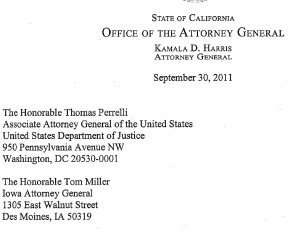Short Sale at the White House?
I haven’t had much time to cover the ins and outs of the foreclosure settlement, which has been genuinely imminent for two weeks, but which is faltering now on banks’ refusal to be sued for anything. My guess is that Eric Schneiderman’s indefinite delay of his presumed announcement that he was joining the settlement last night means he had demonstrated the banks weren’t serious about how narrow they claimed the release to be.
That said, I found this to be a rather interesting article. It confirms what was obvious when they held a meeting in Chicago a few weeks back: this settlement is now the White House’s baby.
The White House has quietly injected itself into ongoing settlement discussions aimed at resolving regulators’ allegations that leading US banks abused struggling homeowners, underscoring the deal’s potential impact on the broader housing market and the presidential election.
Aides to President Barack Obama have in recent weeks courted civil rights groups and borrower advocacy organisations, scheduling meetings and calls in an attempt to gain support for the expected settlement and muffle criticism from key political allies.
Now, one of the aides named in the story is Jon Carson, director of the White House’s office of public engagement. It makes sense that he’d be the one to reach out to groups like NAACP and La Raza, as the story describes (It sounds like NAACP is much more willing to buy this sell than La Raza).
I also find it interesting that they’re reaching out though civil rights groups. That’s because–at least according to the way-too-optimistic release terms posted by Mike Lux–civil rights claims are at the top of the list of abuses not immunized with this settlement.
No release on any fair housing, fair lending, or civil rights claims.
Also, predatory subprime lending has been one of the few abuses actually investigated and, in a few cases, settled (albeit with inadequate payouts).
In addition to Carson, National Economic Council Chair Gene Sperling is the other White House aide named in the article. Granted, he had a big role in the auto bailout, so he has not limited himself to bank issues, but I found it notable in any case.
But here’s one question I’ve got about this article. It says that Sperling and Carson are sharing the terms of the deal.
In addition to sharing confidential details of the settlement terms, the White House has sought to alleviate advocates’ concerns that the liability release is too broad by detailing which legal claims would remain if a settlement were reached.
Really? These confidential details can be shared? Well then, why aren’t they being shared?
That Obama is sharing the purported details of the deal with certain groups is all the more alarming given that the AGs who have been working on this deal for over a year appear to have no idea of what the terms actually are.
In short, it’s not so much that I’m surprised the White House is running this show. It’s that this stinks to high hell of another asymmetrical info op, the kind they pull on national security all the time. By compartmenting information, they ensure people buy off on stuff they have a badly incomplete understanding of.
Look, if NGOs can have access to this information, than so can everyone, from taxpayers to the Attorneys General trying to hold banks accountable.

